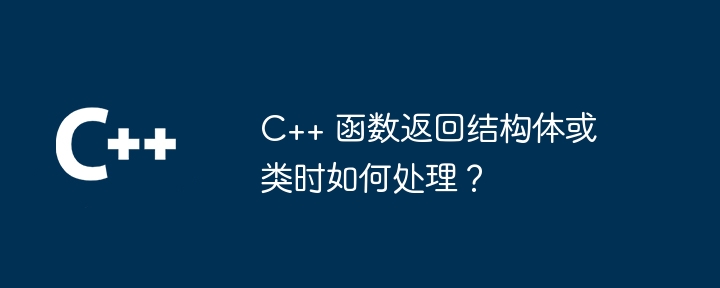Home >Backend Development >C++ >What to do when a C++ function returns a structure or class?
What to do when a C++ function returns a structure or class?
- PHPzOriginal
- 2024-04-20 17:09:011223browse
In C, a function can return a structure or class by reference or copy: Return reference: Using the & symbol, the caller can modify the returned object, and the changes are reflected in the original object. Return a copy: By returning by value, the caller's modification of the copy will not affect the original object.

How to return a structure or class in C
In C, a function can return a structure or class, but this Unlike returning simple data types. In order to return a structure or class correctly, we need to understand the following concepts:
1. Reference
A reference is an alias for a variable. Like a pointer, a reference points to a specific memory address, but unlike a pointer, a reference cannot be reallocated to another address.
2. Return a reference to a structure or class
To return a reference to a structure or class, we use the & symbol. The following is an example:
struct Person {
std::string name;
int age;
};
Person& getPerson() {
// ... 代码 ...
Person person = { "John Doe", 30 };
return person;
}In this example, the getPerson() function returns a reference of type Person. The caller can modify the returned Person object, and the changes will be reflected in the original object.
3. Return a copy of the structure or class
If we do not want the caller to modify the original object, we can return a copy of the structure or class. To do this, we use the value return:
Person getPersonCopy() {
// ... 代码 ...
Person person = { "John Doe", 30 };
return person;
}In this example, the getPersonCopy() function returns a copy of type Person. The caller can modify the copy, but the changes are not reflected in the original object.
Practical case
Suppose we have a Employee class containing employee data:
class Employee {
public:
std::string name;
int salary;
};We can write a function to Returns a reference or copy of the Employee class:
Employee& getEmployeeReference(int id) {
// ... 代码 ...
Employee employee;
// 查找并返回具有给定 ID 的员工的引用
return employee;
}
Employee getEmployeeCopy(int id) {
// ... 代码 ...
Employee employee;
// 查找并返回具有给定 ID 的员工的副本
return employee;
}We can use these functions to get a reference or copy of the employee data as needed.
The above is the detailed content of What to do when a C++ function returns a structure or class?. For more information, please follow other related articles on the PHP Chinese website!

